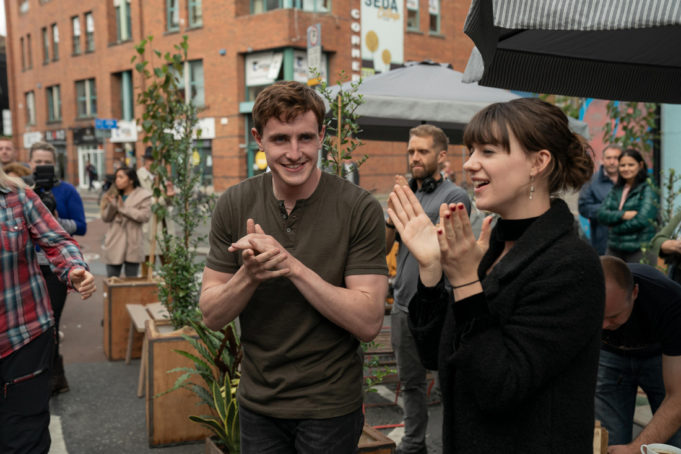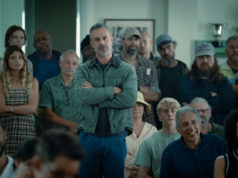If you’ve heard one thing about Normal People, it’s that the new Irish TV miniseries has wall-to-wall sex scenes. Indeed, the second episode alone has four of them, and it runs only half an hour. The show’s producers actually had to issue Pornhub with a cease-and-desist order when the site streamed a 22-minute supercut of sex scenes from the program. The other thing you might have heard about Normal People is that it’s really good, and I’m happy to report that that hasn’t been oversold. It’s a landmark of sorts, because it adds Ireland to the list of countries where good television is made.
The story is based on Sally Rooney’s best-selling 2018 novel, which I didn’t have a chance to read — damn you, coronavirus. It follows our protagonists from their teen years together in the fictional town of Carricklea, County Sligo. Connell Waldron (Paul Mescal) is the handsome, popular star of his school’s Gaelic football team, while Marianne Sheridan (Daisy Edgar-Jones) is the roundly disliked bookworm at the top of her class. Connell’s mother (Sarah Greene) has a part-time job cleaning Marianne’s house, and through this Connell sees that the confidence Marianne exudes melts away when she’s not in school. They start having sex on the sly, because Connell’s afraid of being embarrassed in front of his friends if he’s seen with her, and her self-esteem is low enough for her to go along with it. What sets their lives off on parallel tracks is her suggestion that he’s smarter than he thinks he is and should pursue his talent for writing as a vocation. That’s how they wind up continuing their relationship at Dublin’s fabled Trinity College.
Unlike Britain, Ireland does not have a lengthy tradition of homegrown prestige TV drama, even though Game of Thrones and The Tudors were filmed there. Normal People is bankrolled by Hulu, and you can see a determination to give top-of-the-line treatment to this contemporary Irish story, with Lenny Abrahamson (the Oscar-nominated director of Room) directing the first six episodes. Single episodes were filmed in Italy and Sweden, a luxurious touch for a half-hour show, as well as a necessary one that indicates Connell and Marianne’s broadening sense of the world. “Cities in foreign countries really exist,” marvels Connell as the two of them savor gelato in an Italian piazza.
The book was acclaimed for its psychological insight, and with Rooney on board as co-writer of all the episodes, that comes through here. This is queasily so in an early scene at a school dance, when one of Connell’s friends gropes Marianne’s breast, and as she runs out of the building traumatized, his friends all defend him, with the notable exception of Connell. Marianne is one of those girls that One Direction sang about, who’s beautiful because she doesn’t know she’s beautiful. Charming as that can be, the show demonstrates how that mentality carries a steep downside, springing as it does from a family life marked by abuse from her deceased father and her unrelentingly awful brother (Frank Blake), who seems to have inherited his dad’s tendencies. She attracts more abusive men when she’s not with Connell and experiments with degrading BDSM sex. When they get back together, Connell is shocked when she asks him to rape her.
All this would seem to make Connell the less interesting half of this partnership, but that’s fortunately not the case. He has his own crap to go through, as he ignores Marianne in public because his macho friends expect him to date someone hotter who doesn’t lead with her intelligence. Later, he feels out of place amid the big-city types in Dublin (in contrast with Marianne, who finds a circle of supportive friends), and his demons send him crashing into a deep depression after he hears that one of his Carricklea friends marked New Year’s Eve by jumping off a bridge to his death.
The format of the show seems to be the biggest issue. The cycle of breakups and reunions that Connell and Marianne go through is too abrupt when dealt with in these 12 half-hour episodes. I imagine it played better on the page and might have done so over one-hour episodes. The final scene of the series, too, taking place on the floor of Marianne’s Dublin flat, doesn’t feel like the end somehow and could have packed more of a wallop.
The two actors play the living crap out of it, though. The show compensates for its lack of above-the-line stars by minting a couple of new ones. Mescal has his Irish version of the sensitive-jock thing down pat, and he looks especially beautiful when he cries. Meanwhile, Edgar-Jones is an English actress who slips into the Irish milieu without hitting a false note, and she’s good at playing both the awkward version of Marianne at Carricklea and the more polished version of her at Trinity. People say that the dewy-eyed Edgar-Jones looks like Anne Hathaway, but I’m struck by her resemblance to Sally Rooney.
The sex scenes, too, aren’t just there to generate publicity (though they help, especially when they feature full frontal nudity, male and female). They capture that stage of teenage sexuality when Marianne first discovers sex and wants it all the time. They reveal character, and not just in the aforementioned requested rape scene. It results in a heartbreaking scene when Paul’s email message to Marianne (“I know people have treated you badly, and I include myself in this, but that doesn’t mean you deserve it”) is overlaid with Marianne posing for topless bondage photos for her Swedish boyfriend and realizing that she no longer wants all the punishment. There may not be a happy ending for this romance, but as Connell and Marianne part for a final time, these two deeply insecure and broken people realize how they’ve made each other better, and it is moving like few other dramas achieve. Without resorting to high concepts, this program finds the very stuff of life.












